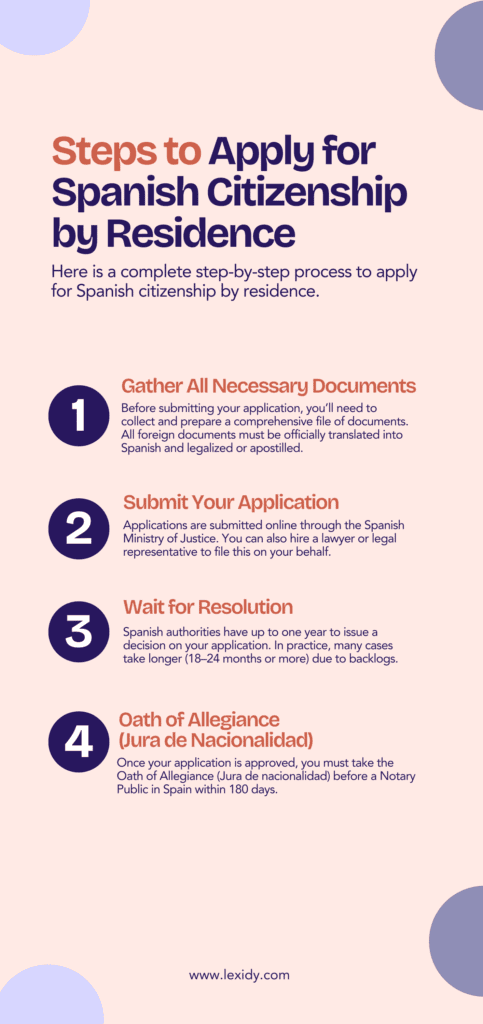Spanish citizenship by residence is one of the most common and straightforward ways for foreigners to become Spanish nationals. By establishing legal residency in Spain and meeting the required timeframes, expats, professionals, and families can open the door to full citizenship.
This guide explains how to obtain Spanish citizenship by residence in 2025, covering eligibility rules, documentation, and the step-by-step process. Along the way, you’ll see why this pathway is so valuable: from securing an EU passport and voting rights to enjoying complete freedom of movement, work, and residence across the European Union.
If you’re ready to move beyond temporary residency and fully integrate into Spanish life, this guide will help you understand the requirements and how to apply successfully.
Table of Contents
- Spanish Residency vs Citizenship: Key Differences
- Who is Eligible for Spanish Citizenship by Residence?
- Key Requirements for Spanish Citizenship by Residence
- How to Apply for Spanish Citizenship by Residence (Step-By-Step Process)
- Common Legal Pitfalls and How to Avoid Them
- Frequently Asked Questions about Spanish Citizenship by Residence
- Ready to Apply for Spanish Citizenship by Residence?
Spanish Residency vs Citizenship: Key Differences
When exploring the path to nationality, it’s essential to understand the difference between Spanish residency vs citizenship. Both allow you to live in Spain legally, but only citizenship provides full political, social, and mobility rights as a member of the European Union.
| Feature | Spanish Residency | Spanish Citizenship |
| Legal Status | Foreign national with legal residency | Full citizen of Spain |
| EU Passport | Not available | Granted |
| Voting Rights | Local elections only (EU nationals) | National and EU elections |
| Visa Renewal | Must be renewed | No renewal needed |
| Work Rights in EU | Limited to Spain | Full freedom to work/live in EU countries |
| Passing on Nationality | Not possible | Can be passed to underage children |
| Subject to Immigration Law | Still applies | No longer applies |
In short, Spanish residency allows you to stay in Spain, but citizenship fully integrates you into Spanish and EU society. With citizenship, you can vote, hold a Spanish passport, and enjoy permanent freedom from immigration formalities.
Who is Eligible for Spanish Citizenship by Residence?
To apply for Spanish citizenship by residence, you must meet specific residency requirements, good conduct standards, and integration criteria. These conditions ensure applicants are not only living in Spain legally but are also part of Spanish society.
Residency Period Requirements
The standard residency requirement is 10 years, but reduced timeframes apply in certain cases:
| Residency Period | Who Qualifies |
| 10 years | Most foreign nationals |
| 5 years | Recognized refugees |
| 2 years | Nationals of Latin American countries, Andorra, the Philippines, Equatorial Guinea, Portugal, or Sephardic Jews |
| 1 year | Spouse of a Spanish citizen (at least 1 year of marriage and cohabitation) Widow/widower of a Spanish citizen (if not separated at time of death) Children or grandchildren of Spanish citizens by birth |
Other Key Eligibility Criteria
In addition to the residency period, applicants must also meet the following requirements:
- Good Civic Conduct: You must have no serious criminal record in Spain or your country of origin. Even minor infractions can still affect the application.
- Sufficient Integration into Spanish Society: This is assessed through mandatory exams, including:
- CCSE: Constitutional and Sociocultural Knowledge of Spain test.
- DELE A2 (or higher): Spanish language proficiency test (waived if Spanish is your native language).
These requirements ensure that applicants are not only legally present in Spain but are also culturally and socially integrated, 2 key factors in obtaining Spanish citizenship by residency.
Don’t qualify for citizenship by residency? Check out our comprehensive guide on How to Get Spanish Citizenship in 2025 to explore all the pathways available to you.
Key Requirements for Spanish Citizenship by Residence
Once you meet the minimum residency period for your situation, you’ll need to fulfill a set of legal and procedural requirements to apply for Spanish citizenship by residence. These include demonstrating integration, legal capacity, and financial stability.
1. DELE A2 (Spanish Language Exam)
The DELE A2 is a Spanish language proficiency test administered by the Instituto Cervantes. It verifies that you can communicate at a basic level in Spanish. This is an essential requirement for integration.
- Who must take it?
- Most applicants whose native language is not Spanish must pass the DELE A2 (or a higher level).
- Exemptions:
- Citizens of Spanish-speaking countries.
- Applicants who completed secondary education in Spain.
2. CCSE (Cultural and Constitutional Knowledge of Spain)
The CCSE exam evaluates your knowledge of Spanish culture, history, geography, and the structure of the Spanish government.
- Who must take it?
- All applicants, regardless of origin, unless exempt.
- Exemptions:
- Those who have completed ESO or Bachillerato (Spanish secondary/high school).
- Individuals with certain intellectual or learning disabilities may request accommodations or exemptions.
3. Legal Capacity
Applicants must have legal capacity to act, which means:
- You are over 18 years old or legally emancipated.
- Minors or individuals with disabilities can apply through their legal representatives.
How to Apply for Spanish Citizenship by Residence (Step-By-Step Process)

Applying for Spanish citizenship by residence involves several formal steps. We have put together a step-by-step guide to help you understand what to expect during the application process.
Step 1: Gather All Necessary Documents
Before submitting your application, you’ll need to collect and prepare a comprehensive file of documents. These typically include:
- Completed application form (Modelo de solicitud de nacionalidad por residencia).
- Valid passport (including all pages, even blank ones).
- Valid residence card (TIE).
- Certificate of continuous residence in Spain (Certificado de empadronamiento histórico).
- Birth certificate, duly legalized and translated if not in Spanish.
- Criminal record certificate from your country of origin and from Spain.
- DELE A2 and CCSE exam certificates (if applicable).
- Marriage certificate (if applying through a Spanish spouse).
- Documentation proving legal capacity (for minors or dependents).
Note: All foreign documents must be officially translated into Spanish and legalized or apostilled.
Step 2: Submit the Application
Applications are submitted online through the Spanish Ministry of Justice. You can also hire a lawyer or legal representative to file this on your behalf.
You’ll need a digital certificate or Cl@ve system access to complete the online submission. After submitting, you will receive a tracking number (número de expediente) to monitor your application status.
Step 3: Wait for Resolution
Spanish authorities have up to one year to issue a decision on your application. In practice, many cases take longer (18–24 months or more) due to backlogs.
You can check the progress of your application online using your expediente number. If your application is approved, you’ll receive a formal resolution (resolución favorable).
Step 4: Oath of Allegiance (Jura de Nacionalidad)
Once your application is approved, you must take the Oath of Allegiance (Jura de nacionalidad) before a Notary Public in Spain within 180 days.
During the oath, you must:
- Swear loyalty to the King and obey the Spanish Constitution and laws.
- Renounce your previous nationality, unless you’re from a country with a dual nationality agreement (e.g., Latin American countries, Andorra, the Philippines, Portugal, Equatorial Guinea).
After taking the oath, your Spanish birth certificate will be issued, and you can then apply for a Spanish national identity card (DNI) and passport.
Common Legal Pitfalls and How to Avoid Them

Applying for Spanish citizenship by residence can be straightforward with proper preparation. Unfortunately, small errors can cause serious delays or, in some cases, outright rejections. Below are the most common pitfalls applicants face, along with advice to avoid them.
Not Registering Continuous Residency Properly
Spain requires legal, uninterrupted residence. Absences from Spain or the Schengen area, shown by stamps in your passport, can reset the residency clock.
Always keep your empadronamiento updated and renew your residency card on time, even if your citizenship application is in process.
Submitting Incomplete or Incorrect Documentation
Missing apostilles, outdated forms, or unverified translations are a common cause of application rejection.
Double-check all document requirements and use certified translators and legalization channels.
Failing to Take or Pass Required Exams
Many applicants assume the DELE A2 and CCSE exams are optional or apply too late.
It’s essential that you schedule your exams early and prepare using official study guides. If you’re exempt, keep proof of exemption (e.g., Spanish school certificate).
Criminal Record Issues
Any criminal conviction in Spain or your home country can disqualify you. Before you apply, request criminal record certificates and consult a lawyer if your record includes past issues.
Missing the Oath Deadline
You must take the oath within 180 days of approval, or your citizenship offer lapses. Monitor your application closely and book your Civil Registry appointment as soon as possible after approval.
Ignoring Dual Nationality Rules
Spain generally requires renunciation of your previous nationality, with few exceptions. Understand your country’s dual nationality agreement with Spain to avoid legal surprises.
Poor Online Submission
Technical errors, expired digital certificates, or failing to receive confirmation of submission can derail the process. Submit with the help of a legal representative if you’re unsure, or use Spain’s Cl@ve or digital certificate system properly.
Because even a small mistake can delay your application, it’s best to work with an experienced Spanish citizenship lawyer. With expert guidance, you can avoid unnecessary setbacks and improve your chances of a smooth approval.
Frequently Asked Questions about Spanish Citizenship by Residence

What is the easiest way to get Spanish citizenship by residence?
There isn’t a single “easy” way to obtain Spanish citizenship by residence. The process always requires meeting legal residency, integration, and documentation requirements. However, some applicants may qualify for shorter residency periods, which can make the path faster compared to the standard 10 years.
- 10 years: Most foreign nationals.
- 5 years: Recognized refugees.
- 2 years: Nationals of Latin American countries, Andorra, the Philippines, Equatorial Guinea, or Portugal.
- 1 year: Spouses or widows/widowers of Spanish citizens, and children or grandchildren of Spaniards by birth.
Even with reduced residency periods, you must still pass the required exams (CCSE and DELE A2, unless exempt), show good civic conduct, and submit all required documents.
How long does it take to get Spanish citizenship by residence from start to finish?
The full process usually takes 2 to 3 years beyond the required residency period. Here’s the timeline:
- Residency period: Between 1 and 10 years, depending on your situation (e.g., 1 year if married to a Spaniard, 2 years for Latin American nationals, 10 years for most others).
- Application processing: Officially up to 1 year, but in reality, it can take up to 24 months.
- Oath of allegiance & issuance of documents: Usually adds a few additional months.
In practice, once you’ve completed the residency requirement, expect about 2 to 3 more years before becoming a Spanish citizen.
Do I need to renounce my original nationality for Spanish citizenship?
Yes, in most cases. However, Spain allows dual nationality for citizens of certain countries, including Ibero-American nations, Andorra, the Philippines, Equatorial Guinea, and Portugal.
Citizens of other countries will usually need to formally renounce their prior nationality during the oath process. To better understand how this works and which exceptions apply, explore our full guide on dual citizenship in Spain.
Can I apply for Spanish citizenship if I have a student visa?
Time spent in Spain on a student visa does not count toward the residency requirement. You must reside in Spain under a residence permit (e.g., work, family reunification, or non-lucrative visa) for the required period.
What happens after my Spanish citizenship application is approved?
Once approved, you must:
- Take the oath of allegiance (jura) at your local Civil Registry within 180 days.
- Register as a Spanish citizen and obtain your Spanish birth certificate.
- With the birth certificate in hand, request your national ID (DNI) and Spanish passport at the competent police station.
After taking the oath, you become a Spanish citizen with full rights and responsibilities. You can officially prove your citizenship once you obtain your passport and national ID (DNI).
Ready to Apply for Spanish Citizenship by Residence?
Spanish citizenship by residence is one of the most reliable ways to secure a Spanish passport and full EU rights. While the process involves meeting the Spanish citizenship residency requirements, preparing documentation, and passing integration exams, the rewards are significant: freedom of movement across Europe, full civil rights, and the ability to pass nationality to future generations.
If you’re planning to apply in 2025, the key is preparation. Understanding the Spanish citizenship year requirement, gathering the right documents, and avoiding mistakes will save you time and stress.
Need help getting started? Fill out the form below to connect with a Spanish immigration lawyer who will guide you step-by-step through the application process.

